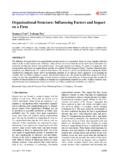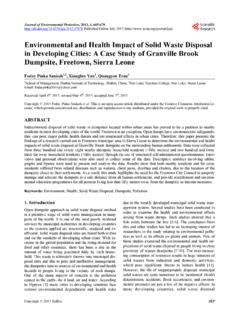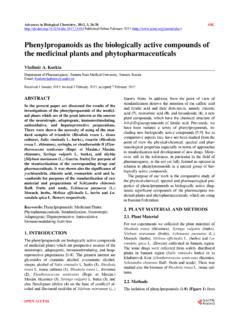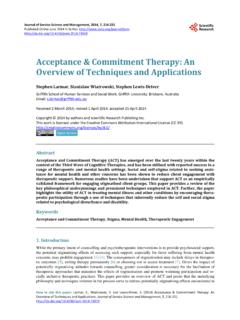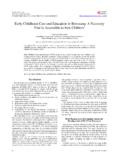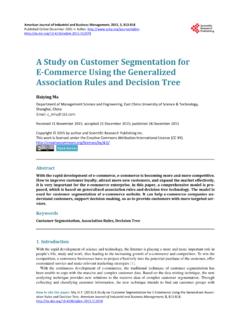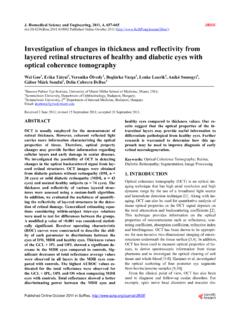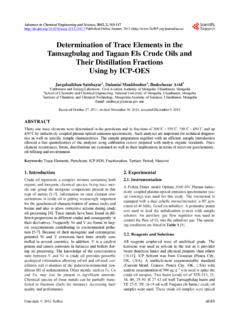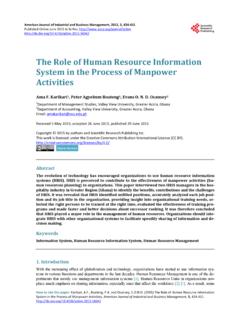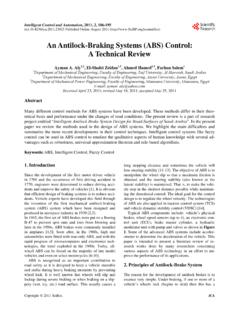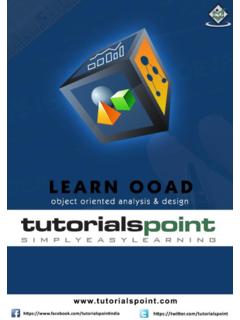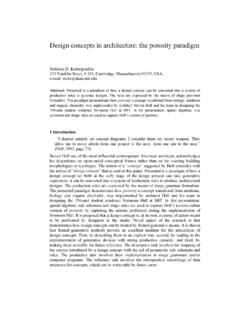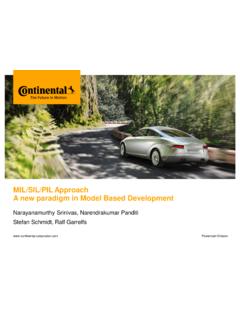Transcription of A Review of the Nursing Paradigm - file.scirp.org
1 Open Journal of Nursing , 2015, 5, 17-23. Published Online January 2015 in SciRes. A Review of the Nursing Paradigm Fatemeh Bahramnezhad1, Mahmoud Shiri2, Parvaneh Asgari3*, Pouya Farokhnezhad Afshar4. 1. Nursing and Midwifery Faculty, Tehran University of Medical Sciences, Tehran, Iran 2. Electronic Engineering Department, Islamic Azad University Iranshahar Branch, Iranshahr, Iran 3. Nursing and Midwifery Faculty, Arak University of Medical Sciences, Arak, Iran 4. Nursing and Midwifery Faculty, University of Social Welfare and Rehabilitation, Tehran, Iran *. Email: Received 1 December 2014; revised 29 December 2014; accepted 7 January 2015. Copyright 2015 by authors and Scientific Research Publishing Inc. This work is licensed under the Creative Commons Attribution International License (CC BY). Abstract Background: Paradigm is the set of acceptability of agents in a field, which provide a framework in which context the scientists' research to solve scientific problems and regulate the series of stu- dies in the field.
2 Aim: The purpose of this paper is a Review of the Nursing Paradigm . Method: This Review was undertaken by library studies using databases such as CINHAL, MEDLINE, Web of Sciences by key words Paradigm , Mono Paradigm , Multi Paradigm , Nursing , Nursing Sciences, separately and in combination in the title, abstract and keywords. Result: Nursing Paradigm de- termines the goals and boundaries like a foundation of a building. Nursing as a moving profession from integrated and continual roles, and the integrated and holistic Nursing is in circulation as a new Paradigm . The Nursing science has come to existence since only a few years ago, and we can say in certain that it is a young and new science but with a good progress. As it is a new science and because of dealing with human being, it has faced numerous scientific developments, and several paradigms are simultaneously created due to multidimensional nature of the human being. Con- clusion: However, considering the work of theorists in recent years, the Nursing is gradually leav- ing the multi-paradigmatic state and progressing to become a single Paradigm .
3 Keywords Paradigm , Nursing , Nursing Sciences, Multi Paradigm , Mono Paradigm 1. Introduction Paradigm comes from the Greek word Paradigma , meaning instance, example and template or model, which is *. Corresponding author. How to cite this paper: Bahramnezhad, F., Shiri, M., Asgari, P. and Afshar, (2015) A Review of the Nursing Paradigm . Open Journal of Nursing , 5, 17-23. F. Bahramnezhad et al. derived from the verb of Paradeiknumi , meaning to display, to provide and to be exposed to. Para means alongside and close , while deiknumi means to point out and to show. The Greek word of Paradigm has been used by Plato in Greek texts as a model or pattern used by the Demiurge (God) to create the universe and the cosmos [1]. In the Oxford English Dictionary, Paradigm is defined as a pattern, model and example. Also, in some dictionaries, the term refers to a set of specific elements and set of all forms inflected based on a stem or theme and is synonymous with Mold, Standard, Ideal, Paragon and Touchstone [2].
4 The modern use of the term in theoretical ideas was begun by Thomas Kuhn's, the American writer, in 1962. [3]. He has known the Paradigm as a scientific revolution based on unprecedented and attractive achievements, which are able to attract the group sufficiently. Kuhn believes that Paradigm is a scientific achievement that pro- vides a framework for academic performance and is a model for explanation [4]. He sees it as a reflecting of opinions and defines it as the scientific community or a society of people having the same discipline [5]. From the view of Kuhn, Paradigm in the natural sciences represents a series of simulated tests and experiments that direct different types of questions relating to a particular topic and makes answering to those questions purpose- ful. In fact, according to Kuhn's opinion, Paradigm in the natural sciences shows how to conduct an experiment and the necessary equipments for them. Also, Nursing is used in Kuhn's definition of Paradigm in defining the Paradigm of Nursing and defining Paradigm isn't independent [6].
5 Paradigm involves public symbols (ideas and concepts), rules, and shared opinions [7]. Although the historian of science (Kuhn) founded a new, different and influencing approach in the history of science by formulation of the theory of Paradigm , he has not provided a unique definition for Paradigm either and has been subject to some sort of confusion [8]. However, the most complete definition of all these definitions of Cohen's can be expressed as follows: Para- digm is the set of acceptability of agents in a field, which provide a framework in which context the scientists research to solve scientific problems and regulate the series of studies in the field [9]. Kuhn believes that scat- tered and various activities done before the formation of a science will be finally accepted and regulated by the scientific community after converting into a Paradigm . Researchers working within a Paradigm are busy with something that Kuhn calls it a normal or normative science, and the efforts of ordinary scientists to explain and match the behavior of some of the related forms in the nature with the help of experimental results are revealed and details and develops the Paradigm .
6 Working on this, the scientists will face some issues and problems, which lead to revocation of some previous statements. If the new sayings, findings and problems are not the kind to be solved and the dominant Paradigm is not capable of responding them, the critical situation will occur. Then, the crisis will end with the emergence of a new Paradigm or a new conceptual model that can answer to the previous unanswered questions and is supported by a community of scientists. In this case, the previously problematic Paradigm is rejected. Such a change and variation between the two paradigms shapes a scientific revolution. The new Paradigm contains new points, and apparently has not the previous issues and problems and conducts the current and future scientific activities. When this reference framework faces with new problems and ques- tions not able to answer them, then, a new crisis forms and another revolution happens in science. The science, which is engaged in the development, is supervised and controlled by a single and dominant Paradigm , and de- fines the allowed standards of practice and research within the science that it observes and engaged in its con- ducting.
7 It also makes relations between the scientists working in a scientific domain and guides and coordinates them [10]. According to Kuhn, what separates the science from non-science is the presence of this Paradigm that pre- serves and sustains the scientific prevailing tradition. Although Kuhn believes that its nature is such that cannot be precisely defined, but it is possible to describe the important components and main constituents, which sta- bilize the concept of Paradigm . The laws and theoretical assumptions of accepted and customary practices con- forming fundamental laws to various conditions or some general principles of metaphysics directing the study of Paradigm period are as such. According to Kuhn, the normal science is solving the Paradigm problems, which are theoretically experimental [11]. Every branch of science has a framework that determines and limits the subject of that science and defines the study methodology and program in that subject as well.
8 In the underlying layers of this program, which was called by Kuhn Paradigm since 1962, the philosophy of that science lies. In such an underlying layer, different sciences can be analyzed and compared together. Different factors including historical and social conditions as well as its nature and subject form this philosophy. Kuhn believes that the development of science is non-cumulative in the sense that the perspectives used by a theory are not added up to the competing theory for more use. Thus, the competition between paradigms does 18. F. Bahramnezhad et al. not involve the cooperation of other paradigms, and only a single Paradigm can be at the top. In other words, the Paradigm emerged would shadow the whole science. Kuhn believes that the development of discipline occurs as convergence. The convergence of a Paradigm as one target of discipline leads to progress. The convergence process is a closed process and unable to interact. In his later writings, Kuhn has replaced the Paradigm word with Disciplinary Matrix , which is similar to Paradigm in terms of definition, with the difference that since in the Disciplinary Matrix, as the content boundaries of a Paradigm are not entirely clear, they appear to be implicit.
9 Thus, examples and instances are used to explain the science. Kuhn's theory has been criticized and even vene- rated as well. Some scientists believe that without such a theory, the development and progress of science has become almost impossible. However, some theorists like Larry Laundan oppose to the Kuhn's theory. Larry be- lieves that the rival's plans will not leave the field by winning of a science; however, they stay and make some coexistence, which would not be perhaps as strong as the main Paradigm , but still having an undeniable role [12]. 2. Method In the present Review research, which was done systematically, the information published in the databases of Medline, Elsevier, Proquest, Google, Google Scholar, SID, Magiran was collected, reviewed, organized, and then compared without any time limit. Keywords such as Paradigm , Mono Paradigm , Multi Paradigm , Nursing , Nursing Sciences, separately and in combination in the title, abstract and keywords were used for researching.
10 The criteria for being included in the research were: using the terms specified in the title, research design, quantitative or qualitative methods of research, and the criteria of exclusion were the studies limited to abstracts and the ones which had a language other than English or Persian. The repeated researches were excluded by software Endnote. 3. Discussion Nursing Paradigm Nursing Paradigm determines the goals and boundaries like a foundation of a building [13]. How we think and give reason for human experiences can help us in making the Paradigm . Theories of Nursing , in their turn, lead to the formation of knowledge, methods and problem-solving activities with international agreement and by the help of a certain discipline. In Nursing , the Paradigm is based on sharing the values and presuppositions of key concepts, such as person, health, environment and Nursing . The boundaries for our key concepts are reflected from the Nursing culture or training, working experiences and values influencing our observations of events and situations.
